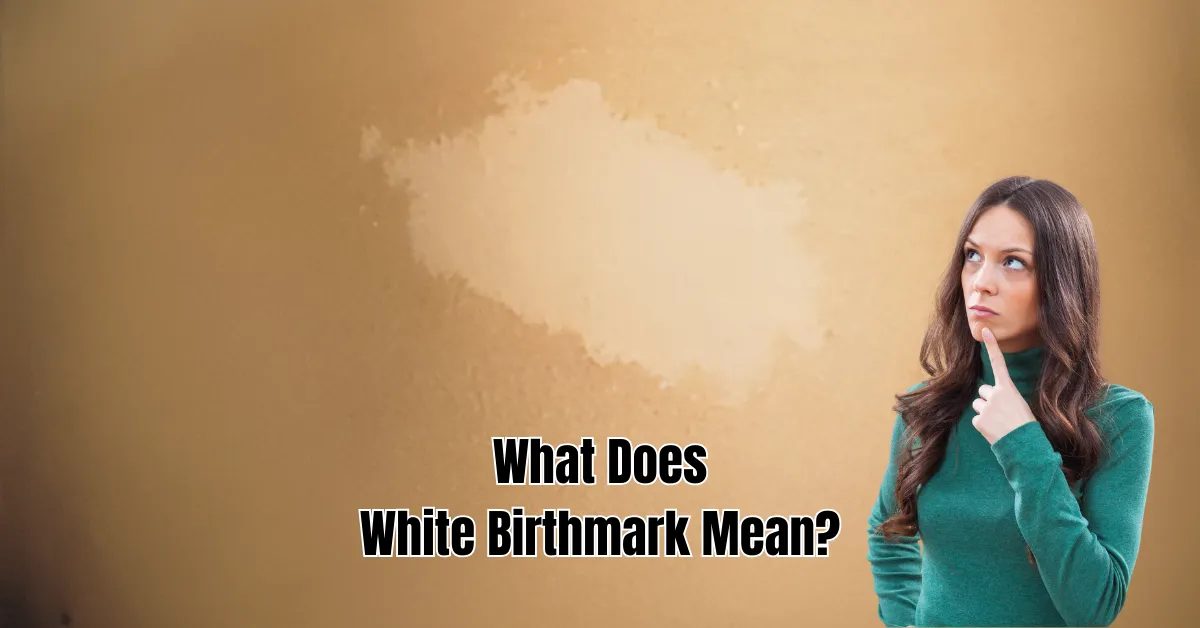What Does White Birthmark Mean: Why Should Embrace It?
Learn about what does white birthmark mean and significance, health implications, and personal stories. Discover the meanings behind white birthmarks, from cultural beliefs to scientific explanations.

Table of Contents
White Birthmark Meaning
Did you know that birthmarks have fascinated people for centuries, often carrying significant meanings and myths? White birthmarks, in particular, have unique interpretations across various cultures and spiritual beliefs.
This blog post we will focus into the intriguing world of white birthmarks, exploring their meanings, scientific explanations, and personal stories.
At the end, you’ll have a comprehensive understanding of what white birthmarks symbolize and how to embrace them.
What Are Birthmarks?
Birthmarks are skin irregularities present at birth or appearing shortly thereafter. They come in various shapes, sizes, and colors, each with distinct characteristics.
- Definition and Characteristics:
- Birthmarks are congenital skin anomalies that manifest as distinct areas differing in color or texture from the surrounding skin.
- They can be either flat or raised, and vary significantly in size.
- Types of Birthmarks:
- Pigmented birthmarks: These are caused by an excess of pigment (melanin) in the skin. Examples include moles (nevi) and café-au-lait spots, which are light brown and usually oval-shaped.
- Vascular birthmarks: These arise from blood vessel abnormalities. Common types include hemangiomas, which are red and raised, and port-wine stains, which are flat and purplish.
The Significance of White Birthmarks
White birthmarks, also known as hypopigmented birthmarks, have distinct cultural and spiritual meanings.
- Cultural Beliefs:
- In various cultures, white birthmarks are often seen as marks of good fortune or special destiny. For instance, in some Asian cultures, they might be viewed as indicators of a past life.
- In African cultures, white birthmarks can be considered signs of spiritual gifts or protection from ancestors.
- Spiritual Interpretations:
- Many spiritual traditions see white birthmarks as symbols of purity and innocence, often suggesting a divine connection.
- They are sometimes interpreted as protective marks, believed to safeguard the individual from harm.
Scientific Perspective on Birthmarks
From a medical standpoint, white birthmarks occur due to a lack of pigment in certain areas of the skin.
- Medical Explanation:
- White birthmarks, such as nevus depigmentosus or hypomelanosis of Ito, result from localized hypopigmentation where melanocytes produce less melanin.
- These birthmarks are typically benign and pose no significant health risks.
- Health Implications:
- While most white birthmarks are harmless, monitoring them for changes in size, shape, or color is essential, as these could indicate other skin conditions.
- Consulting with a dermatologist can provide reassurance and guidance, especially if the birthmark is in a sensitive area or causes cosmetic concerns.
Read More: St Mary on the Lake Peace & Spirituality Center
White Birthmarks in Different Cultures

The meanings attributed to white birthmarks vary widely across different cultures.
- Cultural Comparisons:
- In Japan, white birthmarks may be seen as symbols of wisdom and experience, thought to reflect the person’s spiritual journey.
- In Indian culture, a white birthmark on the forehead is sometimes believed to signify a person of high intellect and spiritual inclination.
- Contrasting Views:
- In Western cultures, the focus tends to be more on the medical and aesthetic aspects of birthmarks, often lacking the spiritual connotations found in other cultures.
- Indigenous cultures may have unique legends and stories that imbue birthmarks with specific significance, often related to nature or ancestral spirits.
Personal Stories and Anecdotes
Individuals with white birthmarks often have unique stories to share, reflecting their personal experiences and societal perceptions.
- Real-life Experiences:
- Many people view their birthmarks as distinctive features that contribute to their individuality. Some share how their birthmarks have become a conversation starter or a source of personal pride.
- Others might have faced challenges, such as teasing or questions, which they overcame by embracing their uniqueness.
- Quotes and Interviews:
- “My white birthmark is a part of who I am. It makes me feel special and connected to something greater,” shares John, who has a prominent white birthmark on his arm.
- Interviews with individuals can provide deeper insights into the emotional and psychological impact of having a white birthmark, highlighting themes of self-acceptance and identity.
How to Embrace Your Birthmark
Accepting and celebrating your birthmark can lead to greater self-confidence and self-love.
- Self-acceptance Tips:
- Focus on the positive aspects of your birthmark and view it as a unique feature that sets you apart.
- Practice self-love and affirmations to build a positive self-image.
- Celebrating Uniqueness:
- Express your individuality by incorporating your birthmark into your personal style, whether through fashion, art, or tattoos that highlight the area.
- Share your story with others to inspire and encourage them to embrace their own unique features.
FAQ about what does white birthmark mean?
What causes white birthmarks?
White birthmarks, also known as hypopigmented birthmarks, are caused by a lack of melanin in specific areas of the skin. This can be due to various conditions such as nevus depigmentosus or hypomelanosis of Ito, where melanocytes (cells responsible for pigment production) are underactive or absent in the affected areas. These conditions are generally benign and result in lighter patches of skin.
Are white birthmarks harmful or a sign of a health issue?
Most white birthmarks are harmless and pose no significant health risks. They are primarily a cosmetic concern. However, it’s important to monitor any birthmark for changes in size, shape, or color, as these could indicate other skin conditions. If you have concerns about your birthmark, consulting with a dermatologist can provide reassurance and help rule out any underlying issues.
Do white birthmarks have any cultural or spiritual significance?
Yes, white birthmarks hold various cultural and spiritual meanings across different societies. In some cultures, they are seen as marks of good fortune or special destiny. Spiritual traditions often view them as symbols of purity, divine connection, or protection from higher powers. The interpretations can vary widely, reflecting the rich tapestry of beliefs and myths surrounding birthmarks.
Can white birthmarks change over time?
White birthmarks typically remain stable throughout a person’s life. However, changes can occur, especially during periods of rapid growth such as childhood and adolescence. It’s crucial to keep an eye on any birthmark and note any significant changes. If a birthmark alters in appearance or starts causing discomfort, seek medical advice to ensure it remains benign.
Conclusion
White birthmarks carry various meanings, from cultural beliefs to scientific explanations.
Understanding these perspectives can help you appreciate the uniqueness of birthmarks and the personal stories behind them.
Embrace your white birthmark, celebrate its significance, and share your experiences with others.
What does your birthmark mean to you? Let us know in the comments!
Reference:
https://www.umassmed.edu/vitiligo/blog/blog-posts1/2020/01/maybe-its-not-vitiligo/
